When I heard that Deloitte had purchased more than one hundred acres to construct a leader development facility in Dallas, I was stunned. What were they thinking?
Then I heard that, in the midst of the great recession, they intended to spend as much as three hundred million dollars in constructing their center. What were they thinking?
I harkened back to stays at other facilities devoted to the development of leaders. GTE came to mind. I worked there three or four times, soon after they built a wondrous center in Connecticut. It was surrounded by forest and trails, with lustrous wood floors and dramatic arching bannisters. I also worked at the Merrill Lynch retreat center, originally created to house their development efforts and converted to provide New Jersey conference space to one and all. A few years later I enjoyed a day in AT&T’s newly dedicated center. Chefs in tall white hats carved roast beef.
Why, I asked. The answer was some variant of, “We want our leaders to want to come to this center. Our ______________ (fill in the blank with one or several from the items that follow: architecture, commitment, cuisine, bucolic setting, game tables, hiking trails, gym….) will make it more likely that they will choose to come here for their development.”
It boiled down to if we build it, they will come.
Mostly, they did not come. A place, even a great place, was not continuously compelling after that initial blush of enthusiasm.
I brought my skeptical self to Texas to find out what the people behind Deloitte University were thinking. As full disclosure, I think Deloitte is chock full of smart people, which I know because I have done work for them in the past. What were those smart people thinking when they chose bricks over clicks?
Welcome to Deloitte University
On April 19, 2012 I visited the Deloitte University campus. As we drove past paddocks and barns, cows, horses, and fields full of butterflies, I relaxed. I might be doubting, but I was going to enjoy myself while doing it.
The building itself was surprising in its simplicity, as you can see above. No balconies on individual rooms, straightforward treatments for the windows.
They saved themselves for the inside of the structures. That rug. The water feature—in the lobby. 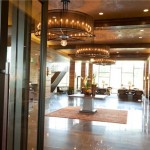 Natural wood everywhere. Leather chairs in a blue that could have been wrong and wound up being right. I looked with longing at the coffee and conversations nooks bathed in natural light. It’s hard to like a hotel lobby. This one was likable.
Natural wood everywhere. Leather chairs in a blue that could have been wrong and wound up being right. I looked with longing at the coffee and conversations nooks bathed in natural light. It’s hard to like a hotel lobby. This one was likable.
When I walked into my room, the TV snapped on. It’s only a hotel room, I said to myself. That it was, but it was a hotel room with fabrics, colors and wall treatments that soothed, and without the clicks of air conditioning with a mind of its own. I wanted to take the showerhead home to San Diego. (I didn’t.)
Beyond the beauty
Nearly one hundred learning executives were gathered at DU to talk about leader development. Just after 2 PM on the 12th of April, we got down to business.
Bill Pelster, a managing principal of Deloitte’s Talent Development unit, welcomed us. Anticipating everybody’s question, he shared the WHY behind the place, acknowledging that Deloitte partners debated clicks vs bricks before they commenced construction. Most of those involved expected that Deloitte would choose to expand their investment in technology. But the top leadership of Deloitte determined otherwise. They selected bricks, because, in their view, it better represents their culture. People at Deloitte, Pelster said, like to be with each other and they benefit from those interactions.
DU is devoted to delivering a cross-functional leadership pipeline. Pelster said that Deloitte was hoping to move beyond their habit of looking to the people they already knew. Now, via concentrated collegial experiences at DU, the pipeline is, in his view, growing better, stronger, more diverse.
Jayne Johnson, formerly at GE in Crotonville, and now leading the leader development process in Deloitte, invited participants to talk about their programs. Many did. For example, Merck’s Nancy Singer said that her organization is good at developing leaders within their areas of expertise, but acknowledged some need to do better at nurturing general managers, especially for service in emerging markets. Eric Paul from Dell noted their shift from a software to a solutions company. Most of us nodded when Paul said, “The soft stuff is really the hard stuff.”
On tour
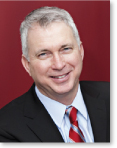 My DU tour leader was Terry Bickham, CLO – Clients & Industries and Markets & Offerings. Terry enjoyed his opportunity to show off his “baby,” a project on which he had worked since the beginning. Terry toured with gusto, while a dozen of us oooooed and ahhhhhed at the landscaping, water feature, sustainability, gym, business centers, and board room. Have I mentioned the food?
My DU tour leader was Terry Bickham, CLO – Clients & Industries and Markets & Offerings. Terry enjoyed his opportunity to show off his “baby,” a project on which he had worked since the beginning. Terry toured with gusto, while a dozen of us oooooed and ahhhhhed at the landscaping, water feature, sustainability, gym, business centers, and board room. Have I mentioned the food?
More disclosure. I’ve known Terry for nearly twenty years, since his years as a Coast Guard officer in graduate school at San Diego State University. When he told me that he would be committing significant time to the creation of DU, I was against it. What about technology? What about the cost of travel? What of time away from clients and projects? What of the issue of transfer from events to practice? Why do you want to be associated with a project that makes people wonder what they and you could be thinking?
Terry acknowledged that I was raising substantive concerns. He said that he and the team wanted to work on solving those meaty problems. It wasn’t going to be certain or easy, and that suited him fine.
When a classroom is more than a classroom
Our tour joined a class with two leaders and 50 participants clustered around tables, facing every whichaway. Bickham talked about teaching from the middle of the room, about how multiple screens and projection systems enable that, assuring that none of the groups or individuals at the small tables are disadvantaged. Each participant looks directly at whatever is projected, sometimes from the instructor, sometimes from a participant’s system.
There is an iPad at each participant station in the room, 400 in total at DU. When Deloitte tallied how much they were spending on printing, it made sense to move participant and instructor materials to the cloud, relying heavily on Sharepoint.
Telepresence was part of the DU classroom experience. We were in a room in Texas. Easy as pie, Brie joined us from Los Angeles. The sound and visuals were wonderful, better than I’d seen in other, older systems.
There is much in that classroom to like– and to worry about. After decades of teaching, I see risk. Something could break down. No, for sure, something will break down. DU anticipated that. In every room, there is a way to communicate with a control center. Help is just minutes away. It’s part of the investment and something difficult for the rest of us to replicate.
The instructors in our session emphasized the importance of a complete experience, of designing in ways to touch participants before, during and after DU events. They emphasized the use of technology to focus learner intention. One mentioned the Cal Wick metaphor about extending the finish line of the class. DU people appear to appreciate that their dramatic, new center is only one performance lever.
Am I a convert?
To some extent I am a convert. Everything about DU says that Deloitte is good at what it does and is committed to investing in its people. Potential customers and employees will get this loud and clear.
But what of leader development? Will DU advance that goal?
There I remain skeptical. Why?
- Now, when DU is brand spanking new, they come. Will leaders continue to venture to Texas to teach and to learn when DU is old hat?
- We know that transfer from a learning event to practice is iffy– under the best of circumstances. Can transfer be systematized? Can they make it happen beyond the campus, where it matters? Will line leaders persist after year one and two? Can they put metrics in place to make the point and advance systemic efforts?
- We should be moving more of learning, information and support into the workplace. DU is the opposite. It enshrines an event that is distinct from workplace performance.
- Will instructors leverage these facilities? Instructors have habits and habits are mighty hard to break.
I gave Terry Bickham a chance to comment on my halting conversion. He responded to a few of my concerns:
We prepare our leaders to teach at DU, as coaches in the new way our people will learn. Our Deloitte Faculty Excellence (DFX) program certification is required to teach at DU and over 2,000 of our leaders have been certified. And note that only one quarter of our learning will occur at DU. The rest will be virtual and on the job. We aren’t putting all of our eggs in the DU basket…
My visit to DU reminded me of many important things about learning, performance and beauty. That’s why I hope you get to visit too.
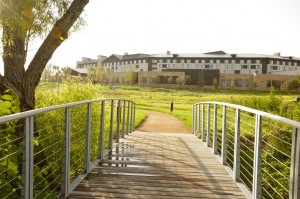
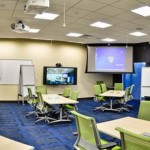

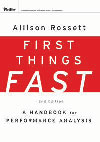
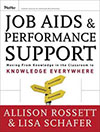
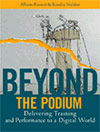


While I love the concept, I wonder if this will create a two-tier system within Deloitte (or others who may choose to emulate the example)? Leaders, or potential leaders, get this wonderful retreat, while staff may not get nearly the same level of “wow” in their own learning (if it happens at all). I share the concern about transfer, and I’m reminded of a number of articles I’ve seen over the years (Antonacopolou, chief among them) where they emphasize the importance of putting new lessons into practice in the workplace. DU’s challenge, as I see it, is going to be measuring the value (not the ROI) of their efforts and whether or not it’s truly transformative for their leadership.
Mark, surprisingly enough, Deloitte uses this facility now for all of its internal training programs. All practitioners get to experience DU, right down to brand new Analysts.
Allison, it was an honor to have you and others at DU. Having the chance to share our new facility and learning with you is exciting for us and we appreciate you calling attention to our commitment as an organization.
As you mentioned, many organizations are currently focused on how to develop leaders and keep up with the dynamic needs of their clients and the marketplace. Our goal (and it’s a lofty one) is to embed learning into the DNA of our organization: on-boarding our new recruits in the most potent way possible, providing rich development experiences via on the job learning and mentoring, inspiring our people with quality, easily-accessible, technology-enabled curriculum, and facilitating connections at DU.
We expect the debate to continue, internally and externally, about the best ways to build leadership and keep growing the skills of America’s workforce and Deloitte is committed to help advance the dialogue. Thanks Allison for taking the time to share your ideas.
There’s so much to be said for experientialism. On one level, DU seems to offer in-your-face opportunities for immediate resolution of conflict and the opportunity to come away from the iPhone, Blackberry or Droid. We’ve become a community in abstentia…dealing in abstracts and defined by on-line interactions. Perhaps it’s time to go back to looking someone in the eye to get the jist of them.
I’ve been doing a research paper on a company where someone with an accounting major would want to work, and I’ve been studying Deloitte heavily. Everything I hear about this place sounds fantastic. It’s heartening to know that some companies really value their employees. I’m hoping to apply for an internship once I get closer to graduating with my associates’ degree next June. It would be wonderful to visit DU at some point, it sounds amazing!
You actually make it seem so easy with your presentation
but I find this matter to be actually something that I think I would
never understand. It seems too complex and very broad for me.
I’m looking forward for your next post, I’ll try to get
the hang of it!
As a former Deloitte employee, I was able to experience DU first hand. The facility is impressive, despite the long walk from the hotel room to meeting and dining locations, reminiscent of stays I’ve had in Las Vegas. There is no doubt Deloitte embraces technology, and now that I am no longer with the firm, I can truly appreciate it in a way that I could not when I was there because I didn’t have anything to compare it to. It’s hard for me to buy into the notion that the facility was built based on how much Deloitte values its people. If people were truly valued, they would be treated less like a commodity, forced to work ridiculous hours and then criticized when quality issues arise. If Deloitte really wanted to set itself apart from the other professional services firms, they’d maintain a headcount that can accommodate new engagements, turnover and unexpected projects instead of staffing to maximum utilization and burning out employees. Instead they say, “it’s the nature of the business,” but only because that’s the culture they’ve created and chosen to perpetuate.
I can’t agree more with this former Employee. The local talent was unnecessarily burned out and staffing concerns were not address accordingly. Instead key individuals were replaced instead of being developed according to the Deloitte way. Leadership principles were definitely not applied to everyone
Very interesting post Allison but I remain unconvinced about the wisdom of this. Its all very impressive but it’s what the big companies did back in the 90s and early 2000s. I’ll be watching to see how it works out over the next 5 to 8 years.
Three years later. Getting to hear about DU from Erv Lessel, a Deloitte Director.
— they didn’t just build buildings and grounds. They rethought and redesigned curriculum. More tech, more virtual, more social, more pre-work
— talked about their classrooms, as Terry did, in the above blog post. Emphasis on flex configurations for the space
— need to take even more advantage of video teleconferencing capacity
— got it right, tied to strategy the new curriculum and space
— need bigger tables, spaces. People are bringing many devices with them… No need for copycats. Everybody carries portable cams w them.
— learning philosophy—- FOCUS ON THE TOUGH.
— It’s not just about the classroom. Also very much about outside the classroom moments, interactions
— demand for this facility is saturated! Erv reports it is seen as successful by leaders and good for culture, engagement
I have heard of the Deloitte University experience from their Atlanta, Georgia leader that it is a wonderful time to expand oneself in a professional place and grow as a leader in one’s accounting discipline.
Ran across this university quite by accident, lived in the area for 23 years. I’m still learning more about what this university has to ACTUALLY offer, but as a nurse, manager and consultant of healthcare for the last 36 years, I am wondering if this is just another expensive write off retreat for the upper management leaders of the top fortune 500 companies that value dollars VS people. So far, what I’ve been able to ascertain from this website is this: Same principles, newer technology & impressive surroundings. I would love to find out that the principles of this university is bold, innovative and futuristic as it claims. If you look at the true great leaders of the world, they are visionary enough to surround themselves with people they value as being smarter than they are. I would like to know how this university will fare in the future by allowing only those “chosen” leaders from society. Whether we like it or not the truth is that the President/CEO of a company is worthless if he/she devalues the thoughts & ideas of his/her employees. Many years ago early in my career I learned a very valuable lesson from a homeless man. I asked him if I could do one thing for him what would it be. His answer: a handshake. The dignity and respect from another human being was more important to him than anything of monetary value I could have given him. I know that one of the many lessons I’ve learned in my career has been that regardless of your “title” in your company, never be afraid to pick up that mop and work side by side with your employees. You CANNOT be a leader unless you truly know your company from the employees perspective looking up, not on YOUR “golden throne of new ideas” looking down.
Apparently you didn’t know where you actually were, as Deloitte is in Westlake, Tarrant County, Texas, and that is not Dallas. Plus, we country bumpkin locals have been trying to figure out just what it is they really do there–when the description is only a pile of corporate buzzword crap instead of a straightforward clear exposition, makes one think the mission is not so well defined….oh, well, nice facility though, whatever it is they do….
Based on the article and some comments above, its worth adding that Deloitte refers to all its employees as Leaders or Potential Leaders. DU is certainly not for the top 1%, more like “all customer facing staff” which makes up the vast majority of the firm. There have been two more DU’s built from the same model including DU EMEA (Belgium) and DU Asia (Singapore).
The DU’s are used for internal Training, Networking, team-building and occasionally Client Meetings and Workshops so its not a narrow use facility rather than a broad use one. In Addition it now forms part of our Client facing Branding for the hundreds of Surveys, Reviews and thought leadership that we publish each year, more here: http://dupress.com/articles/deloitte-university-press/
For Roger: I hope this explains the purpose of DU a bit better https://www.youtube.com/watch?v=m8A-N8C7SQs
Lastly, I acknowledge our former employees comments about burn-out. The nature of the Job is almost the definition of hard work and often bad decisions are made by busy People in difficult circumstances. As a former SOF soldier it was nice to see when I joined Deloitte we didnt have a Monopoly on it!
PS. Sorry for random capital letters, machine language issues.